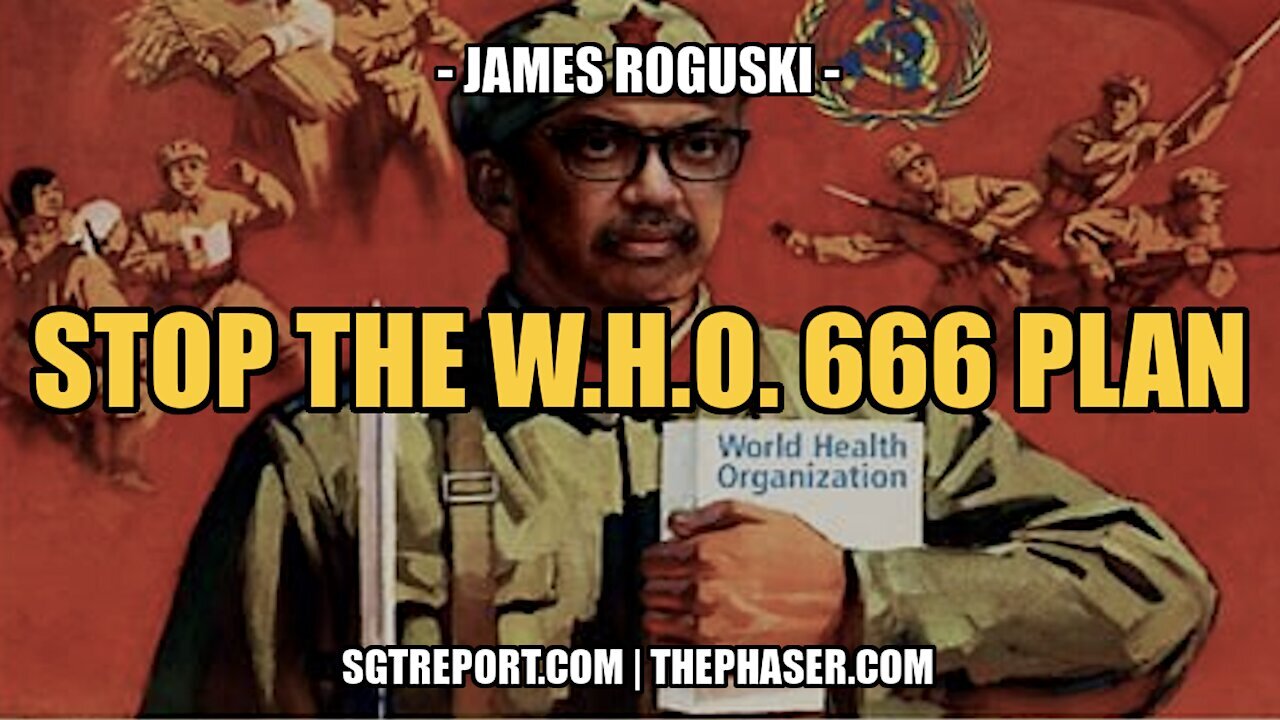Premium Only Content

STOP THE W.H.O. 666 GLOBAL AGENDA!!
-- James Roguski
Researcher and activist James Roguski returns to SGT Report with an urgent warning about the 4-Tiered agenda of the World Health Organization to enslave humanity under the guise of "health" and climate change.
TAKE ACTION NOW!!
https://jamesroguski.substack.com/p/stop-the-global-agenda?utm_source=profile&utm_medium=reader2
TIME IS RUNNING OUT - MULTIPLE DEADLINES ARE RAPIDLY APPROACHING:
September 20, 2023 - The United Nations plans to adopt a “Political Declaration of the
United Nations General Assembly High-level Meeting on Pandemic Prevention, Preparedness and Response”
December 1, 2023 - Deadline to REJECT the amendments to the International Health Regulations that were adopted on May 27, 2022.
Mid-January, 2024 - Deadline for input to the 300+ amendments to the International Health Regulations that are currently being negotiated in secret.
May 2024 - Scheduled date for adoption of the 300+ amendments and the WHO CA+ Framework Convention (AKA: “Pandemic Treaty”)
WE ARE IN THE FINAL STAGES BEFORE THE WORLD HEALTH ORGANIZATION TAKES OVER WITH THEIR
prevention, preparedness and response in September 2023.
IF WE STAY SILENT ITS JUST LIKE WE ARE IN AGREEMENT!!!!!
the President of the General Assembly of the United Nations will convene a one-day high-level meeting on Pandemic Prevention, Preparedness and Response (PPPR) on 20 September 2023.
https://indico.un.org/event/1006966/
Written silence procedure - World Health Organization
Written silence procedure for the consideration of
proposals by the Seventy-third World Health
Assembly between its de minimis and
resumed sessions
https://apps.who.int/gb/ebwha/pdf_files/WHA73/A73(7)-en.pdf
26 July 2024 Final text placed under silence procedure
((((20 September 2023 Adoption of Political Declaration at HLM on PPPR)))
https://www.un.org/pga/77/wp-content/uploads/sites/105/2023/05/Roadmap-on-Pandemic-Preparedness-Final-sent-MS.pdf
General Assembly High-level Week 2023
https://www.un.org/en/high-level-week-2023
General Assembly Adopts Resolutions Deciding Format, Focus of Upcoming High-level Meetings in September on Pandemic Prevention and Response, Fighting Tuberculosis
https://press.un.org/en/2023/ga12493.doc.htm
Heads of State and Government will gather at UN Headquarters in
New York on 18-19 September 2023 to review the implementation of the 2030 Agenda and its 17 Sustainable Development Goals (SDGs)
and provide high-level political guidance on transformative and accelerated actions leading up to the target year of 2030 for achieving the Goals.
The outcome will be a negotiated political declaration. Watch the event live or on demand at UN Web TV.
20 September
High-level Dialogue on Financing for Development
20 September
Climate Ambition Summit
20 September
High-level Meeting on Pandemic Prevention, Preparedness and Response
21 September
Preparatory Ministerial Meeting for the Summit of the Future
21 September
High-level Meeting on Universal Health Coverage
1. The United Nations General Assembly (UNGA) will hold a High-level meeting on pandemic
prevention, preparedness and response in September 2023.
2. Negotiations on a zero draft will progress towards adoption of a WHO Pandemic Agreement
in 2024.
3. The Pandemic Fund, launched by the World Bank in November 2022, will issue a first round of
funding in 2023.
4. State Parties to the International Health Regulations (IHR) will work on proposed targeted
amendments to the IHR (2005) for adoption in 2024.
5. Countries and other stakeholders will develop proposals for the governance and financing of an
equitable countermeasures platform.
6. G7 countries are driving the 100 Days Mission to accelerate development of diagnostics,
therapeutics, and vaccines for pandemic preparedness.
7. G20 countries have established a Task Force to strengthen collaboration between Finance and
Health Ministries on PPPR.
8. The Universal Health and Preparedness Review (UHPR) is being piloted as a peer review
mechanism for strengthening accountability for preparedness.
WRITTEN SILENCE PROCEDURE
1. Following the suspension of the Seventy-third World Health Assembly session and pending its
resumption,
the following written silence procedure will apply in respect of any proposal that the
President of the Health Assembly determines, following informal consultations or because the proposal
was recommended by the Executive Board for adoption,
is suitable for adoption without further
discussion by the Health Assembly.
2. At the request of the President of the Health Assembly, the Director-General will transmit to
Member States any such proposal for consideration under this written silence procedure.
3. The communication will contain the text of the proposal(s) to be considered under this written
silence procedure and will set a date for the receipt of any objection.
Any such objection is to be
conveyed in writing and addressed to the Director-General.
The date for receipt of any objection will be
14 days from the date of dispatch of the communication.
4. In absence of the receipt by the set date of any written objection from a Member State, the
proposal concerned will be considered as having been validly adopted by the Health Assembly. The
adopted proposal will be referred to the Health Assembly at its resumed session for information only.
5. In the event of the receipt by the set date of one or more written objections from a Member State,
the proposal concerned will be considered as having not been adopted by the Health Assembly. The
proposal concerned will be referred to the Health Assembly for consideration at its resumed session.
6. The Director-General will communicate the outcome of the written silence procedure to all
Member States as soon as possible after the set date referred to in paragraph 3.
In the case of a proposal
that is adopted pursuant to the written silence procedure, the date of the Director-General’s
communication to that effect will be date of adoption of the proposal.
7. Without prejudice to the above, any Member State may explain its position in respect of a proposal
that is subject to the written silence procedure by submitting a written statement relating thereto, for
posting on the WHO website.
Written statements should be received by the Director-General by the date
set for receipt of objections under paragraph
3. Written statements will be made available on the WHO
website for information purposes only.
They will appear as submitted and in the language(s) of
submission.
Submission of a written statement in accordance with this paragraph will not be considered
as an objection for the purposes of paragraphs 3 to 5.
A MANIFESTO FOR PREPAREDNESS THREE TESTS OF GLOBAL REFORMS
Now is the time for a 'great reset'
https://www.weforum.org/agenda/2020/06/now-is-the-time-for-a-great-reset/
ABOUT THE GPMB
About the GPMB
The Global Preparedness Monitoring Board (GPMB) is an independent monitoring and accountability
body to ensure preparedness for global health crises. Co-convened by the Director-General of the
World Health Organization and the President of the World Bank, the GPMB comprises of globally
recognized leaders and experts from a wide range of sectors, including health, animal health,
environment, human rights, economics, law, gender, and development.
It is tasked with providing an independent and comprehensive appraisal for policy makers and
the world about progress towards increased preparedness and response capacity for disease
outbreaks and other emergencies with health consequences. In short, the work of the GPMB is to
chart a roadmap for a safer world
Strengthen global governance;
adopt an international agreement on health emergency preparedness and response and convene a Summit of Heads of State and Government,
together with other stakeholders, on health emergency preparedness and response.
Build a strong WHO with greater resources, authority, and accountability.
Create an agile health emergency system that can deliver on equity through better information sharing and an end-to-end mechanism for research,
development and equitable access to common goods.
Establish a collective financing mechanism for preparedness to ensure more sustainable, predictable, flexible, and scalable financing.
Empower communities and ensure engagement of civil society and the private sector.
Strengthen independent monitoring and mutual accountability
These six solutions are the building blocks for a long-term, sustainable, and equitable approach to global preparedness and response.
In the coming months,
the GPMB will continue to advocate for these actions. It will focus its efforts on developing an independent monitoring framework to provide a multisectoral, evidence-based overview of the state of global preparedness and response.
In October 2021,
the GPMB called for world leaders to take five urgent actions to demonstrate their commitment to strengthening pandemic preparedness and response and address the profound inequities and divisions that have characterised this pandemic.
CONTACT INFORMATION
Global Preparedness Monitoring Board Secretariat
c/o World Health Organization
20, Avenue Appia
1211 Geneva 27 | Switzerland
For further details please visit https://www.gpmb.org/ or contact the GPMB secretariat at: gpmbsecretariat@who.int.
gpmbsecretariat@who.int | https://www.gpmb.org/
GPMB calls for a renewed global commitment to ‘six solutions for a safer world’ in 2022
Three tests of global preparedness reforms
1. Are reforms powered to address the catastrophic threat of pandemics?
2. Are reforms designed to deliver equity in access and outcomes,
and to ensure coherence within the ecosystem of PPPR?
3. Is monitoring and accountability embedded in the reforms?
Indicators of success
• Design for accountability. The draft Pandemic Agreement prioritizes accountability and monitoring.
Strong language specifies legally binding obligations, and compliance mechanisms are incorporated,
ensuring that countries can be held accountable for these obligations. Monitoring, including
independent monitoring, is incorporated, to verify accountability.
• High level commitment to monitoring and accountability.
The Political Declaration of the Highlevel meeting on PPPR drives consensus around the importance of objective,
evidence-based and
multisectoral monitoring of PPPR, including independent monitoring.
• Specified responsibilities. Within and across reforms, the role of different actors in delivering
outcomes is clearly defined
Monitoring the tests of global preparedness reforms
UN General Assembly Resolutions Tables
https://research.un.org/en/docs/ga/quick
Resolutions of the 76th Session
https://www.un.org/en/ga/76/resolutions.shtml
The human right to a clean, healthy and sustainable environment : resolution / adopted by the General Assembly
https://digitallibrary.un.org/record/3983329
General Assembly Resolutions on Indigenous Peoples
UN resolution A/RES/76/76
Original link found SGT Report
https://rumble.com/v36deq0-stop-the-w.h.o.-666-global-agenda-james-roguski.html
-
 9:37
9:37
Watchman's Duty
2 months agoIbrahim Traore Speech Sends SHOCKWAVES Worldwide!
3.27K3 -
 LIVE
LIVE
The Rubin Report
32 minutes ago'Shark Tank' Legend Visibly Shocks Hosts with a Dark Prediction & Simple Facts
31,847 watching -
 1:00:34
1:00:34
VINCE
2 hours agoLeft Exploits Dead Children To Attack Trump — Here’s Why They’re Disgracefully Wrong | Episode 79
71.8K63 -
 LIVE
LIVE
LFA TV
20 hours agoLFA TV ALL DAY STREAM - MONDAY 7/7/25
4,665 watching -
 LIVE
LIVE
Badlands Media
6 hours agoBadlands Daily - July 7, 2025
5,930 watching -
 LIVE
LIVE
Caleb Hammer
23 minutes agoM*lf Exploits Young Vulnerable Men | Financial Audit
165 watching -
 LIVE
LIVE
The Big Mig™
3 hours agoDOJ & FBI, Epstein Was Innocent 🤔
5,334 watching -
 1:11:29
1:11:29
Dear America
2 hours agoElon Starts AMERICAN PARTY!! + FBI Says There Is NO Epstein Client List?!🤯😳🤯
85.9K124 -
 LIVE
LIVE
Wendy Bell Radio
6 hours agoUnimaginable Horror
10,237 watching -
 40:42
40:42
Rethinking the Dollar
1 hour agoElon Musk’s Third‑Party: Distraction or Technocratic Backlash? | Morning Check-In
7.56K3